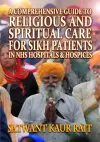
A Comprehensive Guide to Religious and Spiritual Care for Sikh Patients in NHS Hospitals and Hospices
Satwant Kaur Rait - Paperback
£19.99
The author, Dr Satwant Kaur Rait, is a Sikh by faith, and so has an insider's knowledge of the Sikh religion, culture and community. She worked as a librarian in Delhi and in the four local authorities in the UK, and acquired PhD in Library Science. She was on the bench for nearly twenty years and has many books and articles to her name. In her retirement, she became an honorary Sikh chaplain in 2009 in Leeds Teaching Hospitals following her husband's illness and realizing that there is a gap in chaplaincy services for minority faiths. Having a professional background and worked for many years in shaping service provision and delivery; she began her new career with auditing the needs and gathering the experiences of patients and their families using NHS services. Mark Cobb's (2005) book and support from other chaplaincy colleagues helped her to learn, grow, and gain confidence, and, within two years, she collected enough material to write a basic guide, acquired from her own experience with the needs and concerns of patients, for the use of new entrants in this field. As a result, A Guide to Being a Sikh Chaplain was published in 2013. She was keen to learn and studied for a postgraduate certificate (2011) and an M.A. in Chaplaincy in Health and Social Care (2015). Her belonging to a minority faith often deprived her of any opportunity for further development. Her M.A. thesis on pastoral care for Sikhs was published as a journal article in 2017; this encouraged her to self-develop by exploring chaplaincy as a topic of research and school of thought. She carried on working as an honorary chaplain in spite of many barriers. In 2016, she also started working as a spiritual care volunteer along with supporting a bereavement group in St. Gemma's, a local hospice, to test her own ability to provide services to patients of all faiths and none. In August 2017, she was appointed as a visiting Research Fellow at the University of Leeds and in 2019, she began to work as a trained facilitator in patient education on cancer, with Sir Robert Ogden Macmillan Centre in Leeds. During the Covid-19/Coronavirus pandemic, she offered her services by phone on a voluntary basis to LTH and the wider community in Leeds. This period of more than a decade working as a volunteer gave her opportunities to observe chaplaincy politics, treatment, and training given to volunteers, as well as the attitudes of recruiting managers. This made her better equipped to revise and expand her previous book, covering all components of spiritual care with understanding.